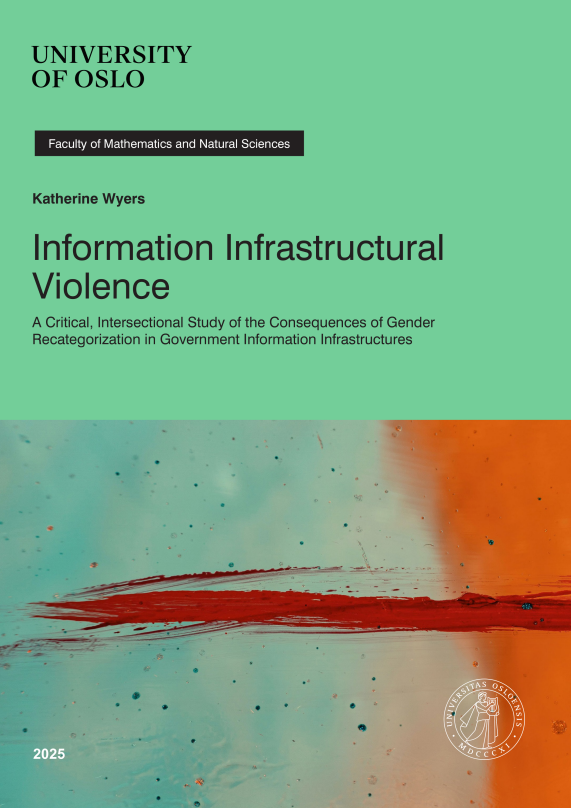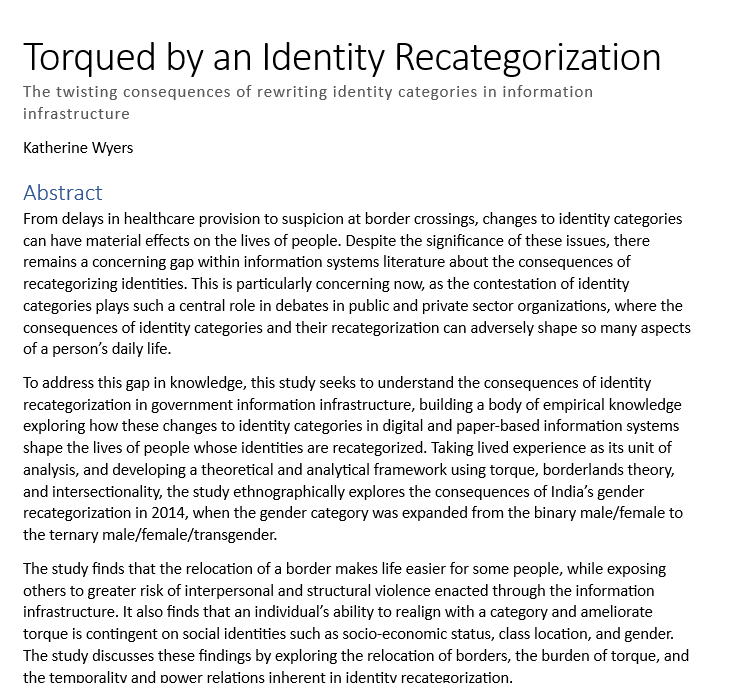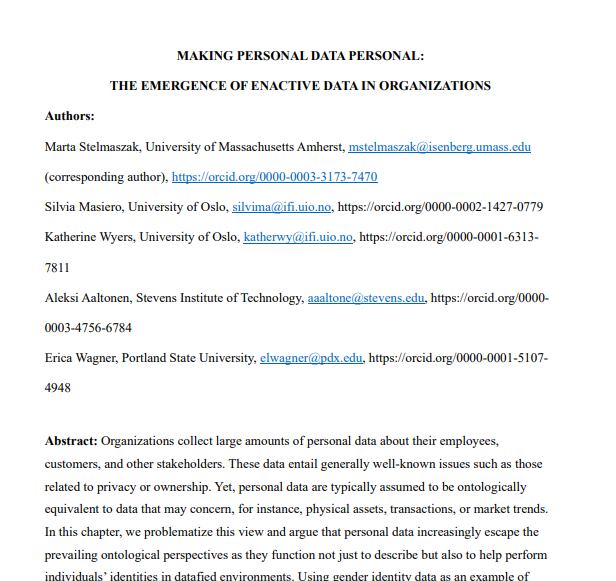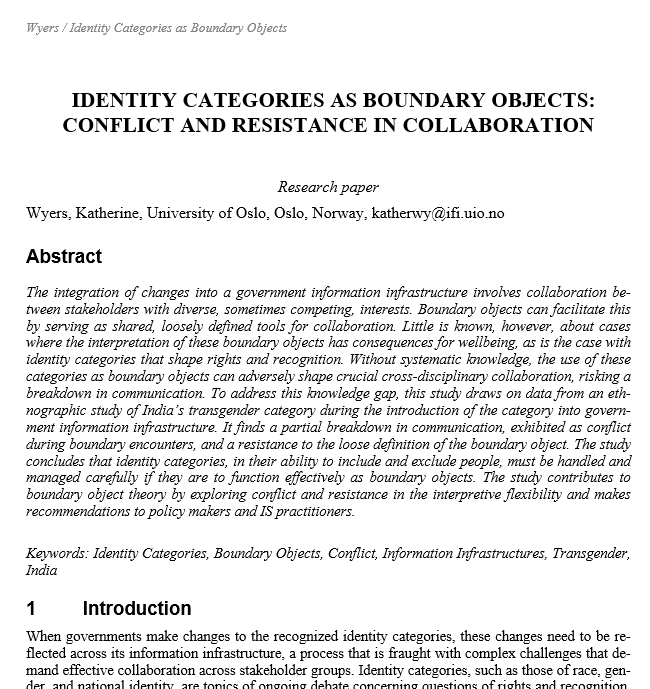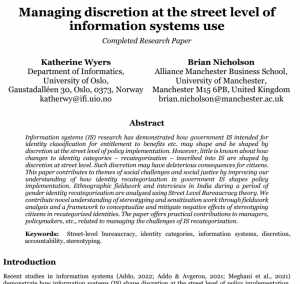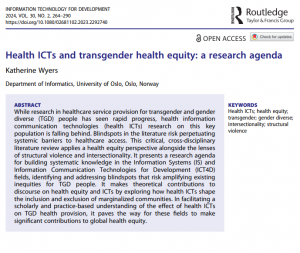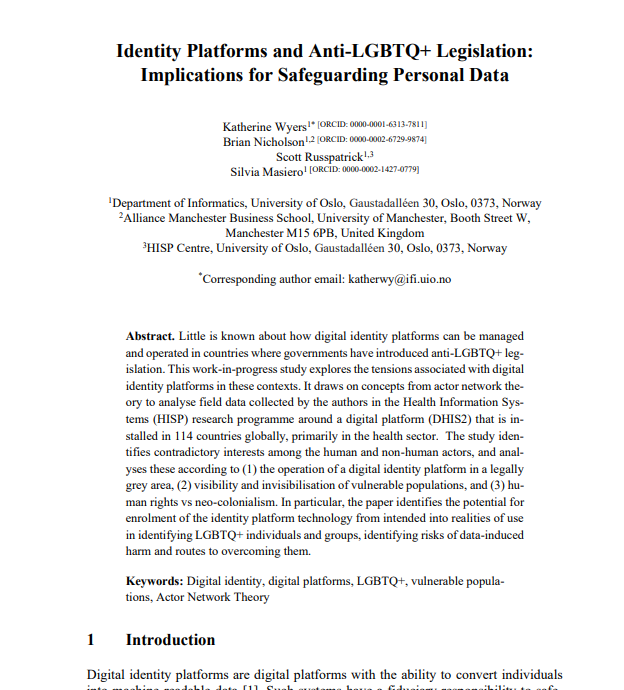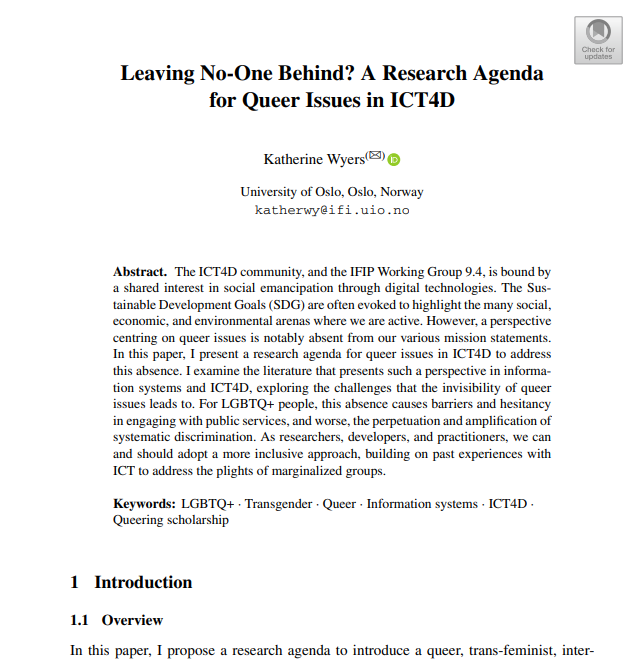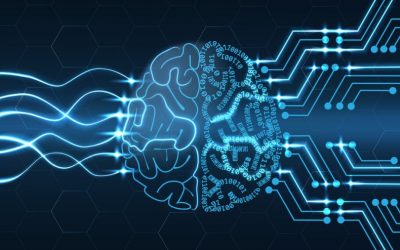data and infrastructure research
software engineering. digital identity data. digital public infrastructures
About Me
I’m Katherine Wyers, an information systems researcher working on data studies and digital public infrastructures. My research focuses on LGBTQ+ people and aims to advance intersectional approaches to the design, use, and governance of information systems. I write and speak about digital identity data, digital public infrastructures, and health ICTs.
I’m an data and infrastructure researcher specializing in identity categorization in information infrastructures. Through several projects in writing, speaking, and outreach, I share research with the goal of advocating for engagement with identity categories and the social consequences of information systems. I am particularly interested in the identity categories of sex, sexuality, and gender, and how theses shape the lives of LGBTQ+ people.
I have worked for ten years as an IT project manager in commercial and humanitarian settings. As the founder of a commercial startup, I developed a business to be active in nine countries. In 2017, I made a career change into the humanitarian sector, where I was based in Thailand and Myanmar for four years as a Senior Software Engineer working with international NGOs and grassroots projects in health and education. Together, we developed sustainable data-management systems and local capacity to handle refugee data management. In 2022, I was the Senior Software Engineering Consultant for a large education management information systems in South Africa.
Now, I’m a doctoral fellow at the University of Oslo, where I am in the final stages of completing my PhD studying how gender recategorization in India’s government information infrastructure shapes the lives of India’s transgender and gender diverse people. I also hold an MSc in Software Engineering from the University of Hertfordshire, and an BA in Management from the University of Wales.
Projects
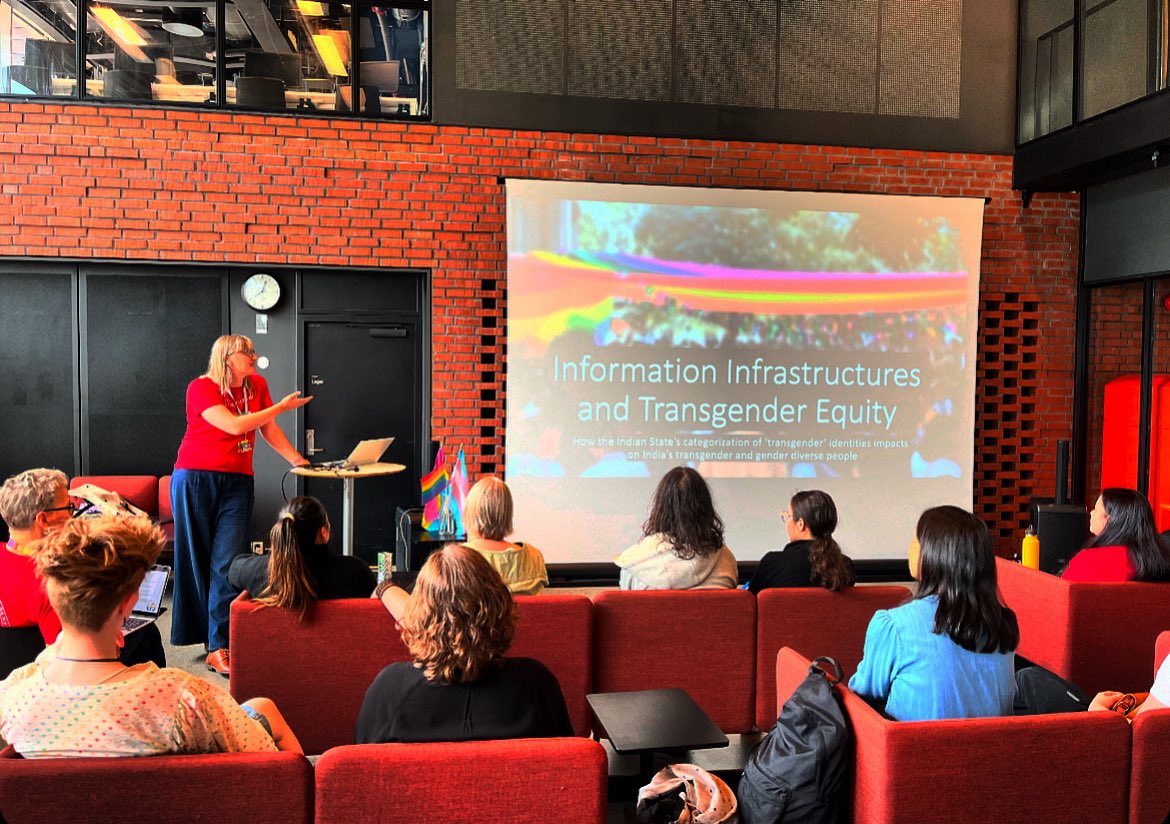
Digital Infrastructures, Digital Identity, and Intersectionality
This project explores the negative consequences of the recategorization of gender by governments. It applies critical, intersectional focus to information infrastructure theory.
Outputs to date
- Doctoral Thesis: ‘Information Infrastructural Violence’ available as Open Access
- Several publications

Digital Infrastructures and Queer Joy
This project explores the relationship between LGBTQ+ people and digital infrastructures through the lens of queer joy, a theoretical lens that critically engages with themes of happiness and goodness.
This project is a cross-disciplinary collaboration with Dr. Zosia Kuczyńska, a specialist in Queer Joy Studies and Creative Archival Praxis.
Output to date
- July 2025: (Re)Imagining Digital Infrastructures and Queer Joy Presentation at ‘Queer Joy as a Digital Good’ symposium, University of Southampton
- Nov 2025: ‘Trans Lives and the Slow Violence of Digital Infrastructures’ Presentation at ‘TRA*I Annual Conference’ Queens University Belfast.

LGBTQ+ Identities and Digital Platforms
This project explores the concerns of digital identity platform owners and the challenges of identifying members of LGBTQ+ communities when those identities are vulnerable
Outputs to date
- IFIP 2023 Conference Proceedings: Identity Platforms and Anti-LGBTQ+ Legislation: Implications for Safeguarding Personal Data
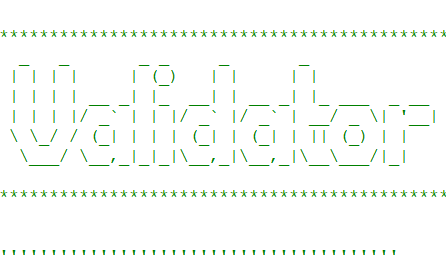
OpenValid for Microsoft Access and Microsoft Excel
OpenValid is an open-source validation module for MS Access and MS Excel to improve data quality. It is used by NGOs and organizations in medical and humanitarian contexts to check whether data input is within valid ranges and prompts the user if the data is out of range. Started in 2018, the software is freely available for use under a creative commons license and is customizable for many different use-cases
Outputs to date
- OpenValid available as an open-source module for MS Access
- https://github.com/KatherineWyers/openvalid-msaccess
Research
Making Personal Data Personal: The Emergence of Enactive Data in Organizations
Book Chapter: Forthcoming
Leaving No-one Behind? A research agenda for queer issues in ICT4D
2022
International Conference on Social Implications of Computers in Developing Countries 2022
Speaking

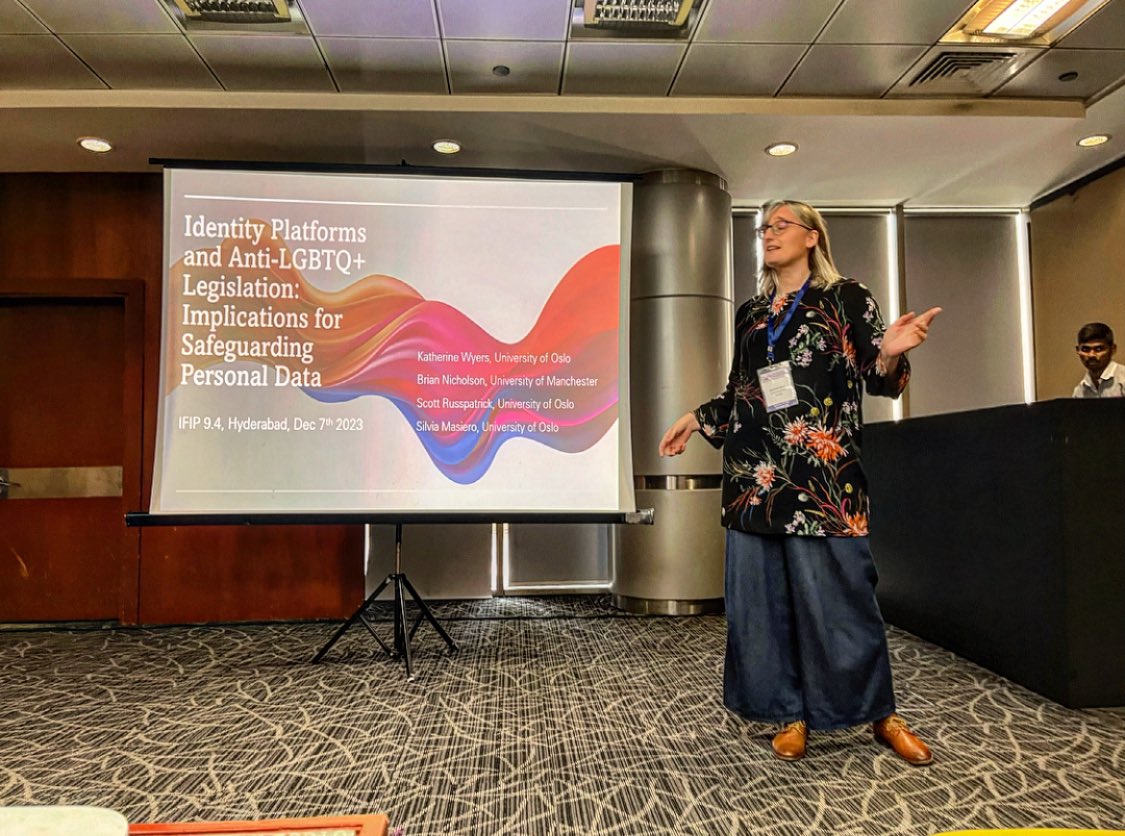
Upcoming
- Jan 27th 2026: Driving Organizational Performance using an LGBTQ+ inclusive HR Strategy – Global Diversity and Equality Management, Human Resources Management Masters Course, University of Edinburgh, Scotland.
Past
- Nov 21st 2025: Trans Lives and the Slow Violence of Digital Infrastructure – Trans Research Association Ireland Annual Symposium, Belfast, Northern Ireland.
- Nov 18th 2025: Information Infrastructural Violence – Public Defence of Doctoral Thesis, University of Oslo, Norway
- Oct 7th 2025: Are your Digital Records Erasing Identities? : Rethinking Gender Categories in Electronic Health Records – Digital Health, Masters-level course, University of Oslo, Norway
- Sept 23rd 2025: Digital Infrastructures and Trans* Equity: Challenges and Pathways – ICT and Global Inequalities Masters-level course, University of Oslo, Norway
- May 9th 2025: Are your Digital Records Erasing Identities?: Rethinking Gender Categories in Electronic Health Records – Skyehuspartner Oslo, Norway
- Dec 22nd 2024: Co-design and gender in ICT4D/ICTD Research, ICTD2024 Conference, Nairobi, Kenya.
- Sept 2024: Infrastructuring Gender Identities: The evolving representation of transgender identities in India’s public service information systems 2014-2024, Norwegian Queer Research Group
- July 2024: Dropdown menus, identity categories, and bureaucratic discretion: How street-level bureaucrats shape social equity in welfare programmes, ICT4D North of England Workshop, University of Bradford, UK.
- June 2024: Information Infrastructures and Transgender Equity: How the Indian State’s categorization of ‘transgender’ identities impacts on India’s transgender and gender diverse people, Pride@IFI Dept. of Informatics, University of Oslo.
Blog
What jazz taught me about boundary objects and interdisciplinary collaboration
I’ve been reading a lot about boundary objects lately. Boundary objects are loosely-defined...
AI and memory: Are we letting the machines help us to forget?
I was recently chatting over lunch with a researcher. We were discussing AI, and whether large...
Uganda’s Anti-homosexuality Act 2023: Implications for Safeguarding LGBTQ+ Personal Data
This week, the Ugandan president signed an anti-LGBTQ+ law that has been condemned as a...


